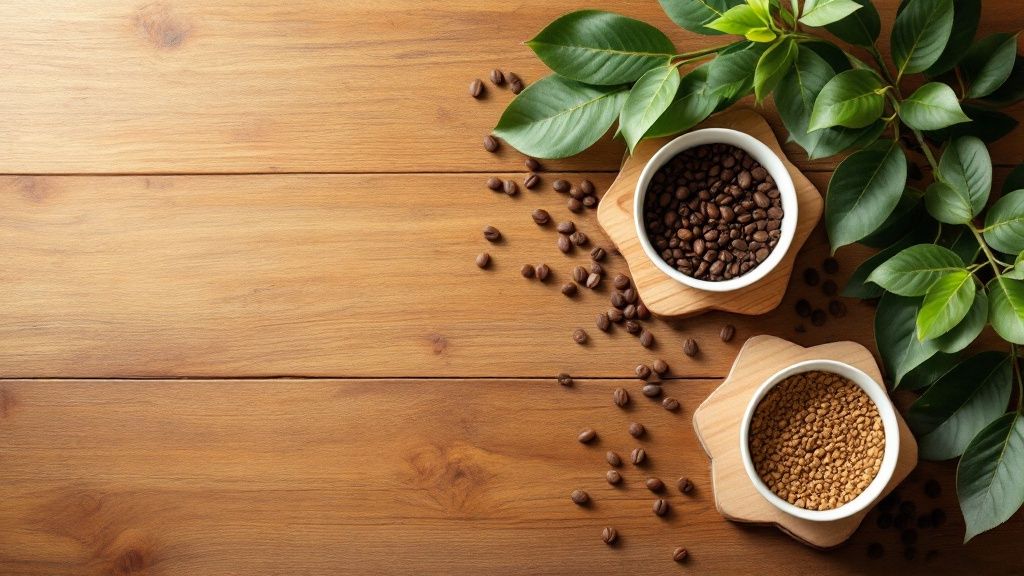
What Is Specialty Coffee: A UK Guide
Share
Specialty coffee. You hear the term thrown around in cafés across Britain, but what does it really mean? It’s far more than a buzzword; it’s a standard for the highest grade of coffee available.
Think of it less like a simple commodity and more like an artisanal product—closer to a fine wine than the instant stuff in your cupboard. Every single detail, from the soil the beans were grown in to the final pour into your cup, shapes its unique character.
Beyond the Buzzword: What Is Specialty Coffee?
Ever wondered what truly separates the coffee you grab on your morning commute from the one celebrated in artisan cafés across the UK? The answer lies in a deep-seated commitment to excellence that touches every hand in the supply chain, from the dedicated farmer to the skilled barista. It’s a world away from mass-produced commercial coffee.
Instead of being a generic, anonymous blend, specialty coffee is all about traceability and transparency. Each bag tells a story. You can often trace the beans right back to a specific farm, a particular region, or even the co-operative of farmers who grew them. This connection is fundamental; it honours the immense effort that goes into producing an exceptional crop.
A Commitment to Quality and Ethics
At its core, specialty coffee is defined by a seriously rigorous quality standard. To earn the ‘specialty’ title, a coffee has to score 80 points or higher on a 100-point scale set by the Specialty Coffee Association (SCA). This grading is done by certified professionals known as Q Graders, who evaluate the green (unroasted) beans.
This score is a guarantee of a cup free of major defects and full of distinct, pleasing flavours. But it's so much more than just a number. It represents:
- Superior Flavour: Expect complex and vibrant tasting notes—from the bright, almost tea-like floral character of an Ethiopian Yirgacheffe to the rich, chocolatey depth of a Colombian Huila.
- Ethical Sourcing: The specialty model often involves direct trade relationships. This ensures farmers receive a fair price that reflects the superior quality of their crop and supports sustainable farming practices for the long haul.
- Meticulous Craftsmanship: Every stage is performed with care and expertise, from hand-picking only the ripest coffee cherries to developing precise roasting profiles that unlock the bean's true potential.
This shift towards quality and consciousness isn't just a niche interest; it's a powerful movement. It transforms our daily ritual into a deliberate choice—one that celebrates flavour, respects provenance, and supports a more equitable supply chain.
This desire for more purposeful products is reshaping the UK coffee scene in a big way. The market is projected to grow significantly, with a compound annual growth rate of around 10.4% between 2025 and 2030. This boom is largely driven by UK consumers, particularly the 18-24 age group, who really value ethically sourced and high-quality products. It's fuelling the rise of both home baristas and third-wave coffee shops. You can learn more about the UK's growing specialty coffee market here.
Specialty Coffee vs Commercial Coffee at a Glance
So, what are the tangible differences between the coffee you find in the supermarket and a true specialty-grade coffee? This quick table breaks it down.
| Attribute | Commercial Coffee | Specialty Coffee |
|---|---|---|
| SCA Score | Below 80 points | 80+ points |
| Sourcing | Anonymous, often from multiple countries | Traceable to a single farm, estate, or co-op |
| Harvesting | Machine-harvested (ripe & unripe cherries) | Hand-picked for ripeness |
| Flavour Profile | Simple, often bitter or generic "coffee" taste | Complex notes (fruity, floral, nutty, chocolatey) |
| Roasting | Often dark-roasted to hide defects | Roasted carefully to highlight unique flavours |
| Bean Quality | Contains defects (broken, mouldy, insect-damaged) | Zero primary defects, minimal secondary defects |
| Focus | Consistency and low price | Quality and unique character |
As you can see, the gap is pretty wide. One is focused on volume and a uniform product, while the other is all about celebrating the unique qualities that make each coffee special.
The Meticulous Journey From Bean to Cup
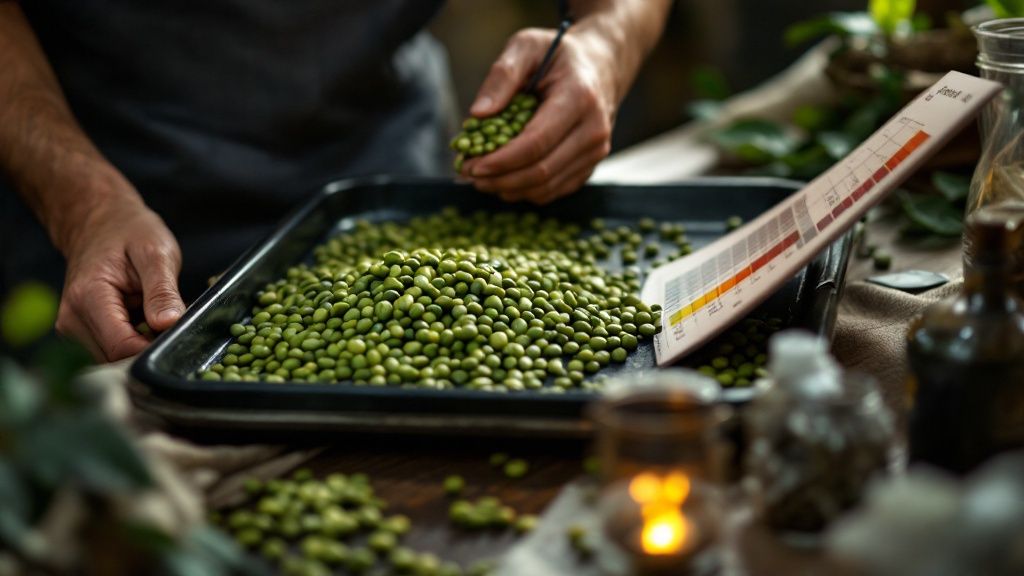
Every great cup of specialty coffee you enjoy in the UK is the final chapter in an incredible story. It’s a story that begins thousands of miles away, not in a roastery, but on a farm where passion, skill, and a bit of agricultural magic come together.
Unlike the vast plantations for commercial coffee, specialty beans are grown in very specific microclimates. These are often high-altitude pockets of land where the unique soil, temperature, and rainfall create the perfect nursery for complex and memorable flavours. It’s best to think of these farms like the world’s great vineyards—it’s all about the terroir.
The Art of the Harvest
The first, and arguably most crucial, step in this journey is the harvest. For specialty coffee, this is almost always done by hand. Skilled pickers move meticulously through the coffee trees, selecting only the perfectly ripe, deep-red coffee cherries.
This is a world away from commercial harvesting, where machines strip every cherry—ripe, under-ripe, and over-ripe—from the branch at once. That approach leads to a mixed bag of quality and, often, a bitter, unrefined taste. Hand-picking ensures only the best of the best, cherries at their absolute peak of sweetness and flavour, move on to the next stage.
This dedication to picking only the ripest fruit is the first promise of quality. It’s a labour-intensive process that honours the coffee's potential and lays the foundation for every exceptional note you taste in the final cup.
This connection to the source is becoming a huge deal for coffee drinkers here in the UK who want to know the story behind their brew. Understanding the supply chain is key, and it’s why resources for creating an online presence for coffee farms are so important—they help connect growers with a global audience.
Shaping Flavour After the Pick
Once the perfect cherries are picked, they have to be processed to get to the green bean inside. This isn’t just a mechanical step; it's where producers become artists. Like winemakers, they use different techniques to profoundly influence the coffee's final flavour profile.
The method they choose is a deliberate decision that completely shapes the sensory experience. You’ll often see these three primary methods mentioned on bags of coffee in the UK:
- Washed Process: Here, all the fruit pulp is washed away from the bean before it's dried. The result? A clean, bright, and crisp cup, often with a vibrant acidity and delicate floral or citrus notes. This process lets the bean’s inherent character shine through.
- Natural Process: The opposite approach. The entire cherry is dried whole, with the fruit still wrapped around the bean. As it dries, the bean soaks up all the sugars and flavours from the fruit, producing a cup with intense sweetness, a heavy body, and bold fruity notes like strawberry or blueberry.
- Honey Process: This is the happy medium. Some, but not all, of the fruit pulp is left on the bean while it dries. This creates a beautifully balanced cup with a rounded sweetness and complex fruit notes that are less punchy than a natural, but more pronounced than a washed coffee.
From the high-altitude farm to the careful processing, this entire journey is what gives specialty coffee its premium status. It’s a real testament to the expertise of farmers and producers who pour their hearts into every single bean.
Decoding the Specialty Coffee Grading System
So, what actually gives a coffee the right to call itself ‘specialty’? It's not just a fancy marketing term. It all comes down to a meticulous, globally recognised process that separates the exceptional from the everyday.
The whole system revolves around the Specialty Coffee Association's (SCA) 100-point scale. Think of it as the Michelin Guide for coffee beans. For a coffee to even enter the specialty club, it needs to score a minimum of 80 points. To put that in perspective, the coffee you find in most UK supermarkets almost always falls well below this line.
This score isn't just pulled out of thin air. It’s the final verdict from a rigorous process called 'cupping', where certified professionals—known as Q Graders—analyse every single aspect of the coffee.
The Art and Science of Cupping
Cupping is basically a standardised tasting protocol. It ensures that a coffee from Ethiopia is judged on the exact same terms as one from Colombia, creating a level playing field for quality.
These Q Graders have spent years training their palates to pick up on the most subtle nuances in a brew. They’re hunting for specific positive qualities while also sniffing out any defects that might bring the score down. It’s a sensory deep dive into the very soul of the bean.
Cupping is what turns taste into objective data. It creates a universal language for quality that roasters, importers, and coffee lovers across the UK can trust, making sure the 'specialty' label is a genuine mark of excellence.
The infographic below shows how factors right at the source—like origin and processing—lay the groundwork for that final score.
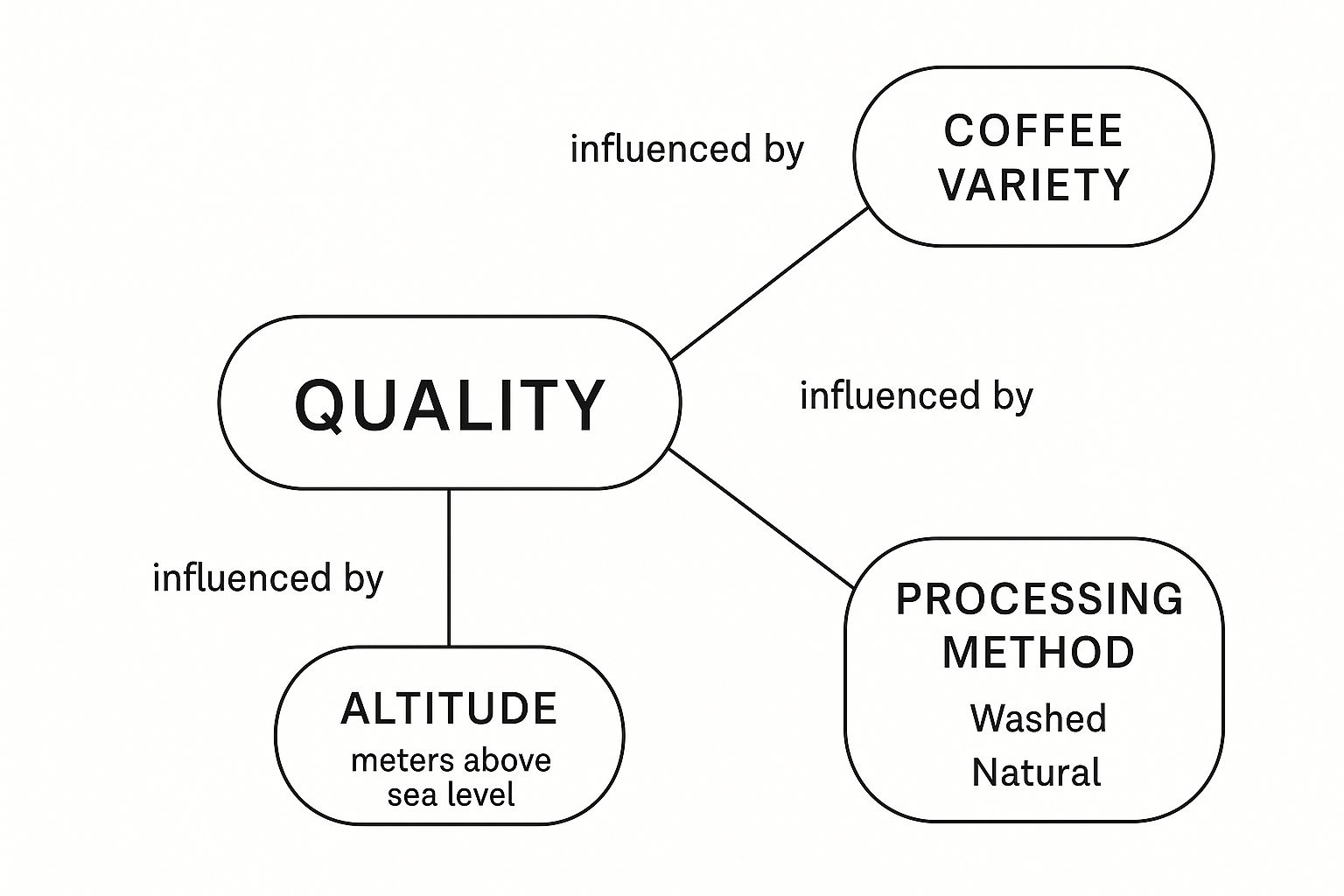
As you can see, things like altitude, the specific coffee variety, and how the beans were processed are the foundational pillars that give a coffee the potential to hit those high scores.
Translating the Score into Flavour
So, what are these Q Graders actually looking for? They're assessing a whole range of attributes that translate directly into the flavours and sensations you get in your cup. Getting your head around these terms will help you decipher the descriptions on coffee bags in UK cafés.
Here are the key things they score:
- Aroma: This is the scent of the coffee, both as dry grounds and once hot water hits them. Graders might pick up on anything from fresh flowers and fruit to warm spices.
- Flavour & Aftertaste: This is the main taste profile and how it lingers after you swallow. Does it taste like zesty citrus, rich dark chocolate, or maybe toasted nuts?
- Acidity: This is a big one. In the specialty world, acidity is a good thing—it’s not sourness. Think of it as a bright, lively sparkle that gives the coffee a bit of a kick, like the pleasant tartness in a crisp apple.
- Body: This is all about the texture and weight of the coffee in your mouth. Is it light and tea-like, or is it heavy, rich, and syrupy?
- Balance: How well do all the other elements play together? A well-balanced coffee is one where no single attribute shouts over the others, creating a complete and harmonious taste.
The next time you see a coffee in a UK shop with an SCA score of 84, you’ll know it’s been professionally vetted and celebrated for these very qualities. It means you’re paying for a guaranteed standard of quality, complexity, and incredible flavour.
Discovering a World of Complex Flavours
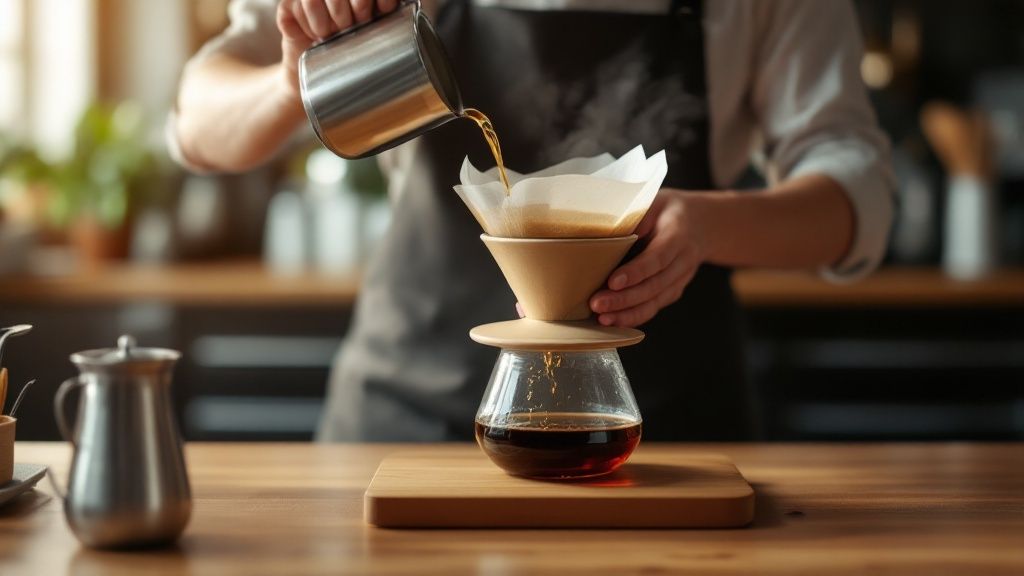
It’s time to move beyond simple descriptions like ‘strong’ or ‘smooth’ and step into the incredible sensory world of specialty coffee. This is where your journey really begins, turning you from someone who just drinks coffee into someone who truly tastes it. Your palate is the key, and learning to use it unlocks a universe of complexity in every single cup.
Let's be clear: coffee isn't just one singular flavour. Much like fine wine or craft beer, it holds a whole spectrum of nuanced notes just waiting to be discovered. This is where tools like the coffee flavour wheel come into play—a visual guide that helps professionals and enthusiasts alike put words to what they’re tasting.
From Vague Ideas to Specific Notes
The flavour wheel is designed to take you from a general idea to a very specific note. It might start with a broad category like ‘Fruity’, which then branches out into ‘Citrus Fruit’ or ‘Berry’, before getting even more precise with descriptors like ‘Grapefruit’ or ‘Blackcurrant’.
This isn't about being pretentious; it's about building a sensory vocabulary. Once you can identify these notes, you start to understand your own preferences on a much deeper level. You’ll be able to walk into any specialty coffee shop in the UK and confidently articulate what you enjoy.
For a UK palate, many of these flavours are already familiar. You might find a coffee that reminds you of:
- The delicate, floral bergamot note in a cup of Earl Grey tea.
- The bright, zesty character of Seville orange marmalade.
- The rich sweetness of a ripe plum or other British stone fruits.
- The deep, comforting taste of a high-quality dark chocolate bar.
Think of it as learning a new language—the language of taste. Each new flavour you identify is another word you can use to describe your perfect cup, empowering you to explore the world of coffee with real confidence.
For roasters and cafés, communicating these intricate flavour profiles is everything. It's not enough to have a great coffee; you need to tell its story. Learning about crafting compelling product descriptions can help bridge the gap between the bean's origin and the drinker's first sip.
How Origin Shapes Your Cup
So, where do all these different flavours come from? A huge part of a coffee's character is determined by its origin. The specific country, region, and even the farm where a coffee is grown—its terroir—imparts a unique taste signature, just like the famous wine regions of France.
This means you can start to predict a coffee’s general flavour profile just by knowing where it’s from. Think of it as your map to finding new coffees you’ll absolutely love.
Here are a couple of classic examples you'll often find in UK coffee shops:
- Ethiopia: Widely considered the birthplace of coffee, Ethiopian beans are famous for their bright, clean, and floral profiles. Expect vibrant notes of jasmine, bergamot, and zesty lemon.
- Brazil: As the world's largest coffee producer, Brazil is known for its smooth, low-acidity coffees. These beans typically deliver those comforting, classic flavours of milk chocolate, toasted nuts, and caramel.
By understanding these connections, your coffee journey becomes a global adventure. You’re no longer just ordering a flat white; you’re choosing to experience the bright, tea-like elegance of East Africa or the rich, chocolatey comfort of South America. And that’s what makes specialty coffee so inspiring.
How Roasters Bring a Coffee’s Story to Life
If farmers write a coffee’s story, then the roaster is the one who tells it. This is where the magic happens—the final, crucial step that turns a muted green bean into the aromatic, vibrant coffee we all know and love. It’s a delicate dance of science and art, where a roaster's touch can either elevate a bean to its full glory or hide its potential completely.
Think of it like a chef working with a world-class ingredient. You wouldn't treat a delicate piece of fish the same way you’d cook a hearty steak, right? It’s the same with coffee. A roaster’s job is to apply heat with precision and care, coaxing out the sugars and acids locked inside to reveal the bean’s unique personality.
The Art of the Roast Profile
Every decision a roaster makes contributes to the roast profile. This is their unique recipe for a specific coffee, mapping out how heat is applied over time to achieve a desired outcome. Different profiles can be used to highlight or soften certain flavours, bringing out completely different dimensions from the very same bean.
Most UK roasters will talk about coffee in these terms:
- Light Roast: This style is all about preservation. Roasted for a shorter period, these coffees let the bean’s origin shine through. Expect higher acidity and bright, delicate notes of fruit and flowers.
- Medium Roast: Striking a happy medium, this profile creates a more balanced and rounded cup. It mellows the bright acidity a little, developing more body and sweetness. This is where you’ll find those classic caramel, nut, and chocolate flavours.
- Dark Roast: Here, the roasting process itself becomes a key part of the flavour. These coffees have very little acidity, a much heavier body, and bold, often smoky notes. While it’s often used in commercial coffee to create a uniform taste, specialty roasters use it sparingly to avoid overpowering a truly great bean’s character.
A great roaster doesn’t force their will on a coffee; they listen to what the bean is telling them. Their skill is in drawing out the complex flavours gifted by its origin and processing, making sure all the farmer's hard work sings in the final cup.
The Rise of Independent UK Roasters
This dedication to the craft is exactly why independent roasters are the heart and soul of the UK specialty coffee scene. Unlike the mass-producers, they work in small batches, which allows for an incredible level of attention to detail. They roast to order, so the coffee you buy is as fresh as it gets—and freshness is everything when it comes to amazing flavour.
Supporting these local businesses is a huge part of the specialty experience. You're not just buying a bag of coffee; you’re investing in craftsmanship, freshness, and the passion of someone who has dedicated their life to perfecting their art. This focus on quality is a massive driver behind the UK's booming coffee market. Projections suggest the total market could hit £7 billion by 2030, with the specialty and premium end of things potentially pushing that closer to £9.2 billion. This growth is all down to people like you who care about quality and the story behind what they consume. You can discover more insights about the UK coffee market's growth.
When you choose an independent UK roaster, you’re picking a partner for your coffee journey—someone who knows how to unlock the incredible potential hidden inside every single bean.
Why Your Coffee Choice Matters
So, what does all this mean when you’re standing in a coffee shop or browsing beans online? After the long journey from a distant farm to a local UK roastery, choosing specialty coffee is about far more than just getting a better-tasting drink.
Your daily coffee becomes a deliberate choice—an investment in quality, a vote for fairness, and a direct boost to the vibrancy of your own community. Every single cup represents a conscious decision to support a system built on respect. It’s a small act with a ripple effect that travels across the globe and right down your local high street.
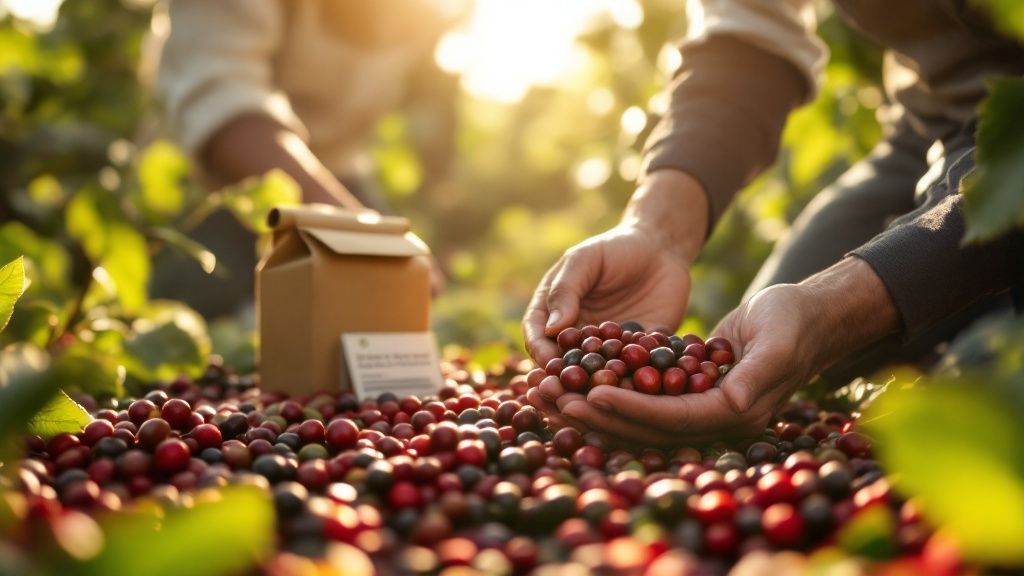
A Choice for Unparalleled Flavour
The most immediate reward is, of course, the taste. You’re choosing a coffee that has been nurtured, graded, and roasted to showcase its absolute best. It’s the difference between a generic, one-note experience and a dynamic cup practically bursting with the unique character of its origin.
This is about experiencing coffee as an agricultural product with a real story, not just as a caffeine delivery system. You get to explore a whole world of complex flavours, from the bright, zesty notes of a Kenyan bean to the deep, nutty chocolate of a Brazilian one.
A Choice for Global Impact
Beyond the taste, your purchase sends a clear message. The specialty coffee model is built to be more equitable from the ground up. Through direct trade relationships and fair pricing, it ensures farmers are properly compensated for their immense skill and hard work.
This isn't about charity; it's about sustainable business. When farmers earn a decent wage, they can invest in their land, their families, and their communities. This promotes agricultural practices that are healthier for the planet in the long run.
Your simple morning ritual becomes a vote for a more sustainable and ethical world. You are directly supporting a system that empowers producers and champions a higher standard of quality from soil to cup.
A Choice for Local Community
That impact is also felt much closer to home. The rise of specialty coffee has revitalised high streets all across the UK. Independent coffee shops have become more than just places to grab a drink; they are essential community hubs where people connect, work, and relax.
These vibrant spaces are now central fixtures in our towns and cities, reflecting a deep cultural shift over the last couple of decades. Even with economic pressures, research shows that our demand for quality coffee experiences remains strong, proving just how much we value these local institutions. By supporting them, you're helping your local economy thrive. You can read the full report on the UK coffee shop market to understand its incredible significance.
Ultimately, choosing specialty coffee is an act of connection. It connects you to an incredible world of flavour, to the dedicated farmers who grew the beans, and to the passionate local business owners who make your community a better place to be.
Frequently Asked Questions About Specialty Coffee
As you dip your toes into the incredible world of specialty coffee, it’s natural for a few questions to pop up. Think of this as your quick-start guide, designed to give you straightforward answers so you can explore the UK coffee scene with confidence and get more out of every cup.
We often get asked these questions, so let's clear them up.
| Is specialty coffee more expensive? We'll explain the price difference by connecting it to the higher quality, ethical sourcing, and craftsmanship involved, reframing it as an investment in a superior product and a more sustainable system. |
| What's the best way to brew specialty coffee at home? This answer will provide simple, actionable advice for beginners, suggesting accessible methods like a French press or V60 and offering a key tip for improving any brew (like using freshly ground beans). |
| How do I find good specialty coffee in the UK? We'll give readers practical tips, such as looking for local independent roasters, checking for SCA scores on packaging, and asking baristas about the origin and tasting notes of the coffee they serve. |
| Does specialty coffee have more caffeine? We'll bust this common myth by explaining that caffeine content is primarily related to the coffee bean type (Arabica vs. Robusta) and brew method, not the 'specialty' grade itself, clarifying that most specialty coffee is 100% Arabica. |
Getting these basics down will help you appreciate what's in your cup even more.
Is Specialty Coffee More Expensive?
Yes, and for good reason. That price tag reflects a genuine commitment to quality at every single step, from the farmer who grows it to the roaster who perfects it. You're not just buying a bag of beans; you're investing in a much fairer, more sustainable system.
The cost covers the incredible skill of farmers who hand-pick only the ripest coffee cherries, the careful grading process, and the expertise of UK roasters who dial in unique profiles. It also means producers get a fairer wage for their hard work. So while it costs more than a supermarket blend, you’re paying for a completely different product—one with unbelievable flavour and real ethical integrity.
What Is the Best Way to Brew at Home?
Honestly, the best way to brew is the one you actually enjoy making every day. You absolutely don't need a complicated, expensive setup to make delicious specialty coffee at home.
For anyone just starting out in the UK, a French press is a great choice—it's incredibly forgiving and gives you a rich, full-bodied cup. On the other hand, a pour-over brewer like a V60 is a fantastic way to really taste the clean, bright notes in a coffee. But the single most important tip? Always use freshly ground beans. It will completely change the game, no matter which brew method you choose.
Don't get lost in the gear. The goal is simple: find a method that you find inspiring and that consistently brings out the best in your chosen beans. A simple process, done with care, will always produce a beautiful result.
How Do I Find Good Specialty Coffee in the UK?
Discovering great coffee has never been easier. The independent coffee scene across the UK is absolutely thriving, and there are a few simple ways to track down the best beans.
- Look for local roasters: Most towns and cities now have their own independent roasters. Buying direct from them not only guarantees freshness but also supports a brilliant local business.
- Check the packaging: Keep an eye out for details about the coffee's origin (country, region, or even the specific farm), tasting notes, and how it was processed. More detail is always a good sign.
- Talk to your barista: When you're in a specialty coffee shop, just ask! Baristas are incredibly passionate about their craft and can tell you the whole story behind the coffee they’re serving.
Does Specialty Coffee Have More Caffeine?
This is a really common myth. A coffee’s caffeine content is mainly down to the type of coffee bean, not its quality score. The two main species you'll hear about are Arabica and Robusta.
Almost all specialty coffee is 100% Arabica, which is loved for its complex, nuanced flavours but actually has less caffeine than its counterpart, Robusta. Robusta beans—often used in instant coffee and commercial espresso blends for their powerful kick and thick crema—can pack nearly double the caffeine. So, a cup of specialty coffee might actually have less caffeine than your standard blend.
Ready to explore the rich and diverse world of specialty coffee? At Ue Coffee Roasters, we've been sourcing and roasting some of the finest beans from around the globe since 2009. From single-origin explorers to seasoned home baristas, we have the perfect coffee and equipment to elevate your daily ritual. Discover your next favourite brew and start your journey with us today at https://www.uecoffeeroasters.com.
